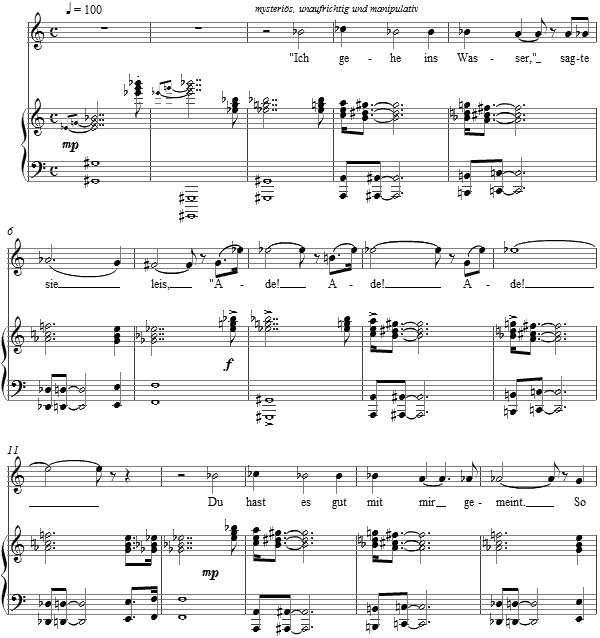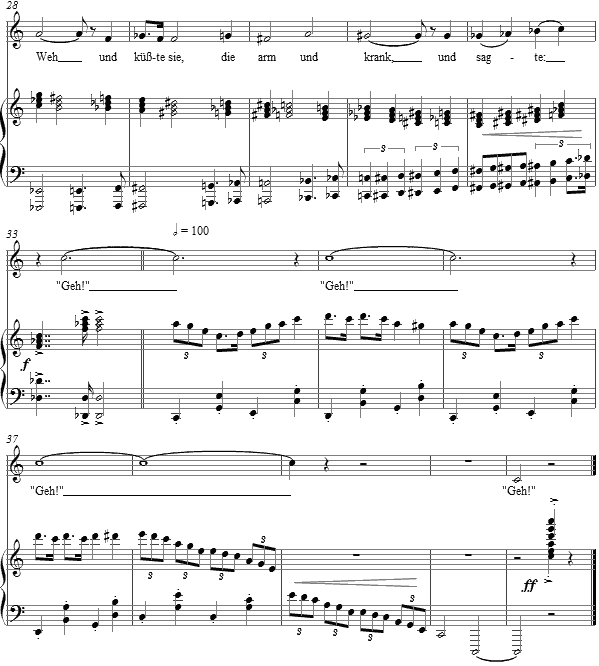Music and Texts of GARY BACHLUND
Vocal Music | Piano | Organ | Chamber Music | Orchestral | Articles and Commentary | Poems and Stories | Miscellany | FAQs
Der letzte Weg - (2009)
Joachim Ringelnatz
for medium voice and piano
"Ich gehe ins Wasser," sagte sie leis,
"Ade!
Du hast es gut mit mir gemeint.
So weiß ich einen, der um mich weint.
Hab Dank!"
Ich aber sah ihr tiefes Weh
Und küsste sie, die arm und krank,
Und sagte: "Geh!"[ 2 pages, circa 1' 30" ]
Joachim Ringelnatz
"I go to drown myself," she said lightly,
"Good-by!
You have been so much a part of my life.
So I know full well that you will weep over me.
Thank you!"
But alas, I saw her deep sorrow
and kissed her gently, this poor sickly one,
and said: "Go!"
Mark Twain wrote, "You can find in a text whatever you bring, if you will stand between it and the mirror of your imagination. You may not see your ears, but they will be there." [ 1 ] One finds some sites referring to this text by Joachim Ringelnatz (1883-1934) as somehow appropriate to mourning, but I suggest they have read into it "whatever they bring," for the text was published in 1910 and is surrounded by other comic/ironic commentaries on life. Therefore I see this text as a comment on those who would employ the threat of suicide as a weapon to manipulate others. How sad, indeed, when such manipulations fail -- which is the sense I take from Ringelnatz' wondrous little lesson. Indeed I have known personally of an instance or two of highly manipulative and empty threats of suicide, which some modern counselors suggests should always be taken seriously; this view is however only empowering to those who would cynically manipulate others, and, as in all of life, one's own judgment should prevail in such matters. Sometimes it is appropriate with Ringelnatz to simply say, "Go!" [ 2 ]
The G sharp in the bass leads to the A of measure 4, while the E flat major in the treble drops to A minor above it. The emphasis on "falling" chromaticism collapsing over the rising chromaticism beneath it suggests that sense of pressurization which the suicidal tell us they feel. The vocal line is marked, "mysterious, insincere and manipulative" suggesting that this largest portion of the song setting be overly dramatized, just as the dynamics as marked also suggest.
The "long and short" of Ringelnatz' response to the dramatically suicidal woman is portrayed musically in a rapid and curt playoff in a music hall style reminiscent of the "one liner" jokes which some humorists have made as below. The vocal line shifts from the rise and fall of chromaticism to a simple, repeated C in quite naturally C major. The double time tempo also makes an abrupt shift from the "pressure" of the minor-triad chromaticism folding in upon itself.
The score for Der letze Weg is available as a free PDF download, though any major commercial performance or recording of the work is prohibited without prior arrangement with the composer. Click on the graphic below for this piano-vocal score.
NOTES
[ 1 ] In "A Fable," by Mark Twain, published with The Mysterious Stranger. According to Twain, it is so easy to call another man liar, for each having seen something different in the same phenomenon. Certainly this seems true in politics, above all, as it does in the modern penchant to overly politicize art and science. " The last portion of this tale of animals seeing their own reflection in a mirror and trying to decide what sort of "picture" this was reads:
"This is very strange," said the elephant; "the cat was always truthful before--as far as we could make out. Let another witness try. Go, Baloo, look in the hole, and come and report."
So the bear went. When he came back, he said:
"Both the cat and the ass have lied; there was nothing in the hole but a bear."
Great was the surprise and puzzlement of the animals. Each was now anxious to make the test himself and get at the straight truth. The elephant sent them one at a time.
First, the cow. She found nothing in the hole but a cow.
The tiger found nothing in it but a tiger.
The lion found nothing in it but a lion.
The leopard found nothing in it but a leopard.
The camel found a camel, and nothing more.
Then Hathi was wroth, and said he would have the truth, if he had to go and fetch it himself. When he returned, he abused his whole subjectry for liars, and was in an unappeasable fury with the moral and mental blindness of the cat. He said that anybody but a near-sighted fool could see that there was nothing in the hole but an elephant.[ 2 ] As to humor about suicide, many commentators consider such as, at the minimum, "insensitive." Yet literature is filled with stories of death as the consequence of poor decisions, as one finds throughout fables of many cultures. Moreover, humorists have been consistently and thankfully "insensitive."
One might hear again the old joke, "Q. How many times have you committed suicide? A. Four times."
H. L. Mencken observed, "Suicide is belated acquiescence in the opinion of one's wife's relatives." The acerbic and sometimes harsh Bill Maher commented, "Suicide is man's way of telling God, 'You can't fire me - I quit,'" but long before, Friedrich Nietzsche made the ironic observation that, "The thought of suicide is a powerful solace: by means of it one gets through many a bad night."
Even Mahatma Gandhi noted, "If I had no sense of humour, I would long ago have committed suicide."
Lastly as to the aggressive, manipulative side of threats of suicide, psychologist Karl Menninger wrote, "Is it hard for the reader to believe that suicides are sometimes committed to forestall the committing of murder? There is no doubt of it. Nor is there any doubt that murder is sometimes committed to avert suicide."
With such as the above comments, it seems Ringelnatz' seemingly abrupt "Go!" seems sometimes the most appropriate response for a variety of reasons, not the least of which being the world's modern political movements aiming to legalize and thereby encourage suicide under law, quite the opposite of those who would consider not treating all threats of suicide as "insensitive."
The world is a funny place indeed, and man sometimes the funniest thing about it.
S


